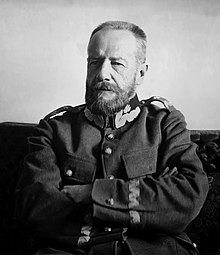Lucjan Żeligowski
| General Lucjan Żeligowski |
|
|---|---|
 |
|
| Leader of the Republic of Central Lithuania | |
|
In office October 12, 1920 – March 24, 1922 |
|
| Preceded by | Part of Lithuania |
| Succeeded by | Merged into Poland |
| Personal details | |
| Born |
October 17, 1865 Oszmiana, Russian Empire (partitioned Poland) |
| Died | July 9, 1947 (aged 81) London, England |
| Nationality | Polish |
| Awards |
|
| Military service | |
| Allegiance |
|
| Years of service | 1885-1926 1939-1940 |
| Rank | General |
| Commands | Front Commander Head of State of Central Lithuania Minister of Military Affairs |
| Battles/wars | Russo-Japanese War, Great War, Polish-Ukrainian War, Polish-Bolshevik War, Invasion of Poland |
Lucjan Żeligowski (Polish pronunciation: [ˈlut͡sjan ʐɛliˈɡɔfskʲi]; 1865–1947) was a Polish general, politician, military commander and veteran of World War I, the Polish-Soviet War and World War II. He is mostly remembered for his role in Żeligowski's Mutiny and as head of a short-lived Republic of Central Lithuania.
Lucjan Żeligowski was born on October 17, 1865, in Oszmiana, in the Russian Empire (modern Ashmiany in Belarus) to Polish parents Gustaw Żeligowski and Władysława Żeligowska née Traczewska. Before the Partitions of Poland in the late 18th century the town was part of the Polish-Lithuanian Commonwealth. After graduating from military officers' school located in Riga (1885), Żeligowski joined the Imperial Russian Army, where he served at various staff and command posts. He then married Tatiana Pietrowna and had two children.
Żeligowski fought in the Russo-Japanese War of 1904-1905. During the First World War he served as a lieutenant colonel and commanding officer of an Imperial Russian rifle regiment.
After the February Revolution of 1917, Żeligowski became one of the organizers of the Polish Army in the former Russian Empire. Initially commander of an infantry regiment in the ranks of the Polish 1st Corps, he was quickly promoted and given command over a brigade. In 1918 he started the creation of a Polish unit in the area of Kuban, which eventually became the 4th Polish Rifle Division. As part of the Polish Army, his unit fought alongside the Denikin's Whites in the Russian Civil War. In October of the same year he became the Commander in Chief of all the Polish units fighting in Russia.
...
Wikipedia
